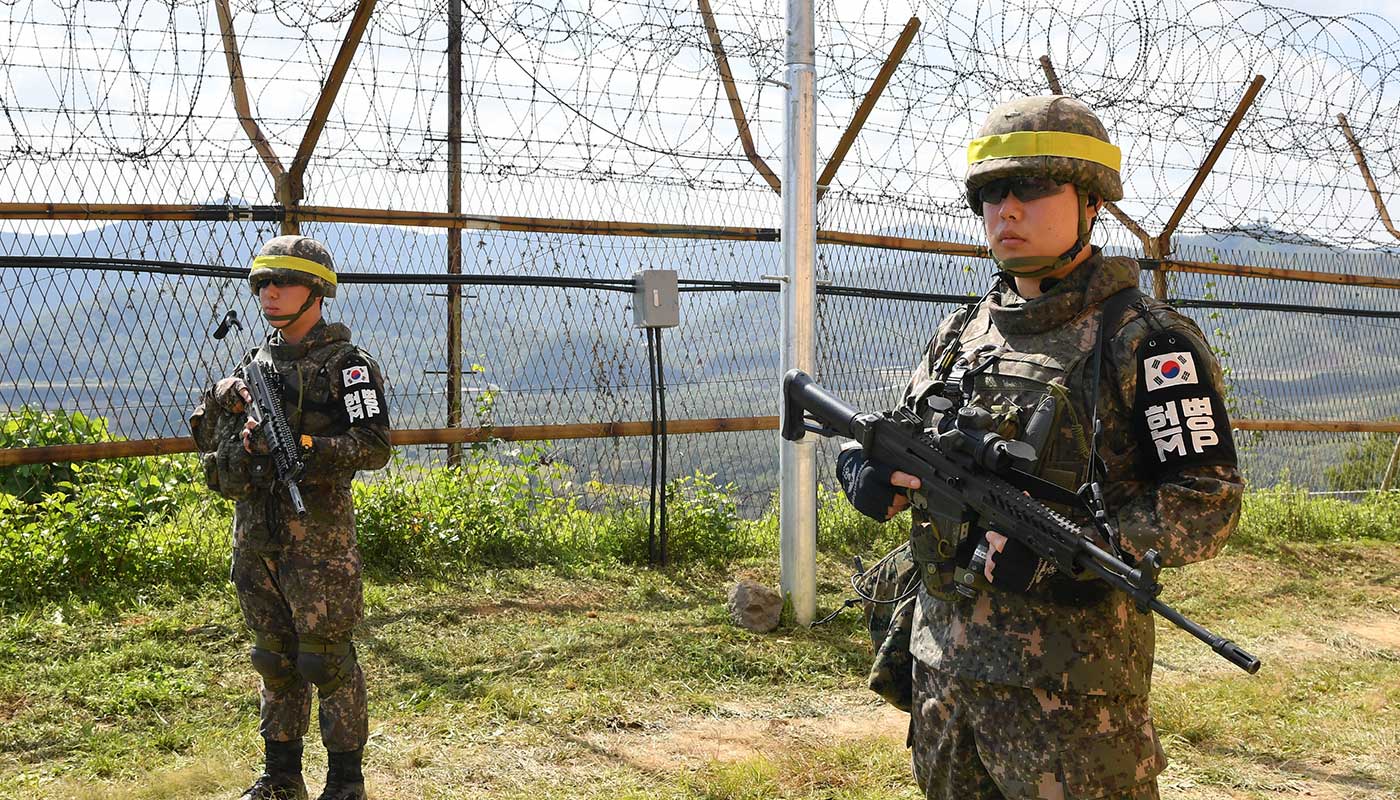North and South Korea agree to remove weapons from border
Guard posts and firearms set to be removed from demilitarised zone village of Panmunjom

A free daily email with the biggest news stories of the day – and the best features from TheWeek.com
You are now subscribed
Your newsletter sign-up was successful
North and South Korea have reportedly reached an agreement to cut down on guard posts and firearms along the border between the two countries.
The agreement, which stemmed from a second round of tri-lateral talks between Pyongyang, Seoul and the UN Command (UNC), will see 11 guard posts removed from inside a one-kilometre radius of the Military Demarcation Line.
All firearms will also be removed from the so-called “truce village” of Panmunjom, which straddles the demilitarised zone (DMZ), in a sign of warming relations between the two Koreas.
The Week
Escape your echo chamber. Get the facts behind the news, plus analysis from multiple perspectives.

Sign up for The Week's Free Newsletters
From our morning news briefing to a weekly Good News Newsletter, get the best of The Week delivered directly to your inbox.
From our morning news briefing to a weekly Good News Newsletter, get the best of The Week delivered directly to your inbox.
Each country will also cut numbers of personnel stationed at the Joint Security Area (JSA) at Panmunjom to 35 by Thursday, with a two-day joint inspection by all sides to follow.
Earlier this month, the two Koreas began the removal of landmines at the JSA, in an operation that took 20 days but only removed a fraction of the landmines known to have been planted in the DMZ since the Korean War.
US general Vincent Brooks, the current commander of US forces in South Korea, said he “supported initiatives that could reduce military tensions”, The Guardian reports, although he highlighted a “reasonable degree of risk” in Seoul’s plans to dismantle guard posts near the DMZ.
Reuters reports that the US has “concerns that the inter-Korean military initiative could undermine defence readiness”, noting that the announcement “comes without substantial progress on North Korea’s promised denuclearisation”.
A free daily email with the biggest news stories of the day – and the best features from TheWeek.com
The “divergence in methods” between Seoul and Washington D.C when it comes to dealing with Pyongyang “has already sparked some tension between the allies and analysts fear more is to come”, says the Financial Times.
-
 Political cartoons for February 3
Political cartoons for February 3Cartoons Tuesday’s political cartoons include empty seats, the worst of the worst of bunnies, and more
-
 Trump’s Kennedy Center closure plan draws ire
Trump’s Kennedy Center closure plan draws ireSpeed Read Trump said he will close the center for two years for ‘renovations’
-
 Trump's ‘weaponization czar’ demoted at DOJ
Trump's ‘weaponization czar’ demoted at DOJSpeed Read Ed Martin lost his title as assistant attorney general
-
 Israel retrieves final hostage’s body from Gaza
Israel retrieves final hostage’s body from GazaSpeed Read The 24-year-old police officer was killed during the initial Hamas attack
-
 China’s Xi targets top general in growing purge
China’s Xi targets top general in growing purgeSpeed Read Zhang Youxia is being investigated over ‘grave violations’ of the law
-
 Panama and Canada are negotiating over a crucial copper mine
Panama and Canada are negotiating over a crucial copper mineIn the Spotlight Panama is set to make a final decision on the mine this summer
-
 Why Greenland’s natural resources are nearly impossible to mine
Why Greenland’s natural resources are nearly impossible to mineThe Explainer The country’s natural landscape makes the task extremely difficult
-
 Iran cuts internet as protests escalate
Iran cuts internet as protests escalateSpeed Reada Government buildings across the country have been set on fire
-
 US nabs ‘shadow’ tanker claimed by Russia
US nabs ‘shadow’ tanker claimed by RussiaSpeed Read The ship was one of two vessels seized by the US military
-
 How Bulgaria’s government fell amid mass protests
How Bulgaria’s government fell amid mass protestsThe Explainer The country’s prime minister resigned as part of the fallout
-
 Femicide: Italy’s newest crime
Femicide: Italy’s newest crimeThe Explainer Landmark law to criminalise murder of a woman as an ‘act of hatred’ or ‘subjugation’ but critics say Italy is still deeply patriarchal